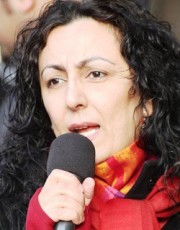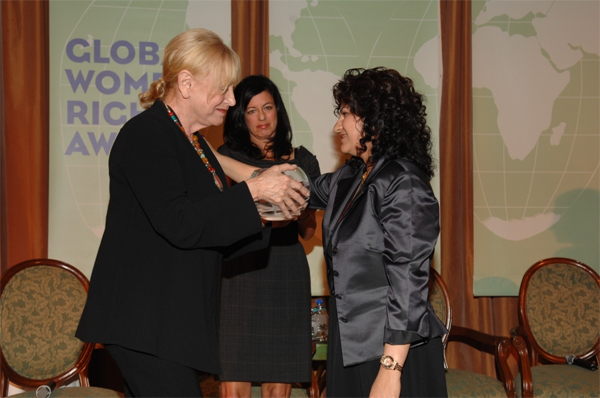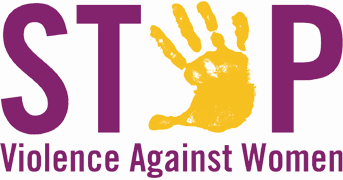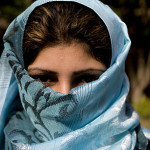 “There has been so much injustice and oppression in Iraq, for such a long time. To fight it is almost an obligation.” Houzan Mahmoud: was born in Iraqi Kurdistan in 1973. As a Kurd living under the regime of Saddam Hussein, she grew up with an intimate understanding of discrimination, injustice, lack of rights, and oppression—and the urgent need to resist them. From the mid 1970s, Houzan’s family was involved in politics and struggle against the dictatorship. “My family was involved in a leftist group called Komalei Ranjdaran. As a child and teenager growing up in a highly political family, the struggle for freedom, equality, social justice and living with dignity were a part of my upbringing.” Houzan did not join any political groups while in Kurdistan, but she has adhered to socialist and egalitarian principles all her life and, in May 2003, she joined the Worker Communist Party of Iraq (WCPI) in London.
“There has been so much injustice and oppression in Iraq, for such a long time. To fight it is almost an obligation.” Houzan Mahmoud: was born in Iraqi Kurdistan in 1973. As a Kurd living under the regime of Saddam Hussein, she grew up with an intimate understanding of discrimination, injustice, lack of rights, and oppression—and the urgent need to resist them. From the mid 1970s, Houzan’s family was involved in politics and struggle against the dictatorship. “My family was involved in a leftist group called Komalei Ranjdaran. As a child and teenager growing up in a highly political family, the struggle for freedom, equality, social justice and living with dignity were a part of my upbringing.” Houzan did not join any political groups while in Kurdistan, but she has adhered to socialist and egalitarian principles all her life and, in May 2003, she joined the Worker Communist Party of Iraq (WCPI) in London.
Like many of those who opposed the Saddam Hussein regime, Houzan also stood against the US-led invasion, “Operation Iraqi Freedom,” in 2003. “I believe that the US and UK agenda was not to liberate people from dictators,” she says.“In fact, they helped Saddam to stay in power and oppress people. And now we see a government which is a puppet of the US, made up of so many little dictators, this time based on ethnic, sectarian, tribal and religious groups.”
Houzan foresaw the catastrophic consequences of the invasion for Iraqi civilians – especially women and children – who were already living in deprived circumstances because of the decade-long economic embargo. “I was six years old when war first came to Iraq,” Houzan recounts. “And it has never stopped since. In conflict situations, life cannot progress. I was a teenager during the Iraq-Iran war, and I finished my high school studies just after the general uprising against the regime in 1991. I am aware of the consequences war can have on the lives of people. Before this war even started, we already knew that the women and children of Iraq would be the first casualties.”
Since 2002, Houzan Mahmoud and Yanar Mohammed – the founder of OWFI –have, together with other courageous Iraqis, made their voices heard across the world in an endeavour to protect women and girls in Iraq and Kurdistan. The Organization of Women’s Freedom, based in Baghdad, has worked to offer women and girls refuge from domestic violence, kidnapping and honour killing, while also raising awareness about the conditions in which women and girls live in Iraq. OWFI stood against occupation of Iraq, and also against the emergence of Islamist Militia groups who impose what Houzan calls “an Islamist life-style of the Dark Ages on women”.
OWFI is a grassroots organization aimed at helping women in need, no matter their background or history. OWFI’s radio and newspaper – Al Mousawat, or “Equality” – gives voice to ordinary women, women whose stories would not otherwise be heard. “People say they do not want to speak about prostitution and consider it a “shameful” issue to speak about,” Houzan observes. “But we should openly discuss all the issues and oppressions women are facing, however “shameful” these issues may be for some. Otherwise, these women would feel abandoned.” She adds: “OWFI’s aim is to be there for those women who don’t have a life, those who did not receive an education, those who have been forced to become prostitutes, those who are widows, and those who have been beaten, tortured and raped.” OWFI strives to empower women, to help them to achieve equality and protect their rights. As Houzan points out, the organization is also concerned to establish a secular constitution “without discriminatory laws against women, such as Islamic Sharia Law.”
“In Iraq, some elite women entered politics and were elected to Parliament,” Houzan tells us. “But,” she laments, “Many of them don’t fight for women’s rights. For the political parties, these women are just a way of respecting the gender quotas. The women are utterly beholden to their party leadership.”
Secular and independent, OWFI has often been discredited and its achievements have rarely been recognized by the Iraqi government, which has yet to bestow NGO status upon the organization. “We’ve had to face many challenges in the last few years in order to maintain our independence,” Houzan says, “—including threats to our persons.” Still, she affirms with a smile: “OWFI’s progress is amazing. The first time I went to Baghdad after the invasion, the Organization was just beginning. Last year, I went back once again, this time it was a different story; the radio, newspaper, our office full of activists and the Women’s Prisons Watch were all flourishing.”
Over the past five years, the Organization for Women’s Freedom in Iraq has built on the brave and relentless efforts of women like Houzan Mahmoud and Yanar Mohammed. “Working alongside people as determined and dedicated as Yanar gives me new energy every day,” Houzan says. “When you see how motivated we all are, how dedicated everyone is to doing what it takes, you do not want to walk away.”
Today, Houzan’s work continues in London and Iraq, across Europe and the world, as she organizes events and conferences on women’s issues and promotes OWFI and its activities. “I wish that all women could determine the course of their own lives,” she reflects. “I wish that they could decide for themselves who to love or whether to get divorced. They have a right to act on their desires.” In the face of obstacles, she remains pragmatic, concluding that: “An essential step is to secure an independent income for women, even a small one. We should find some way to enable women to become autonomous. It is as simple as that.” “Women should have freedom, voice, right to determine their own future, and they need to have political awareness about their own oppression and how to fight back.”
OWFI’s daily achievements inspire Houzan’s continued commitment to defending the human rights of ordinary people. “My hope is that the women and men of Iraq and Kurdistan will involve themselves in the struggle for equality. There has been so much injustice and oppression in Iraq, for such a long time. To fight it is almost an obligation,” she asserts. “This is how I became involved, and why I will always be.”
By Maria Fantappie
Source: http://w4.womensworldwideweb.org/w4/?q=houzan_mahmoud




